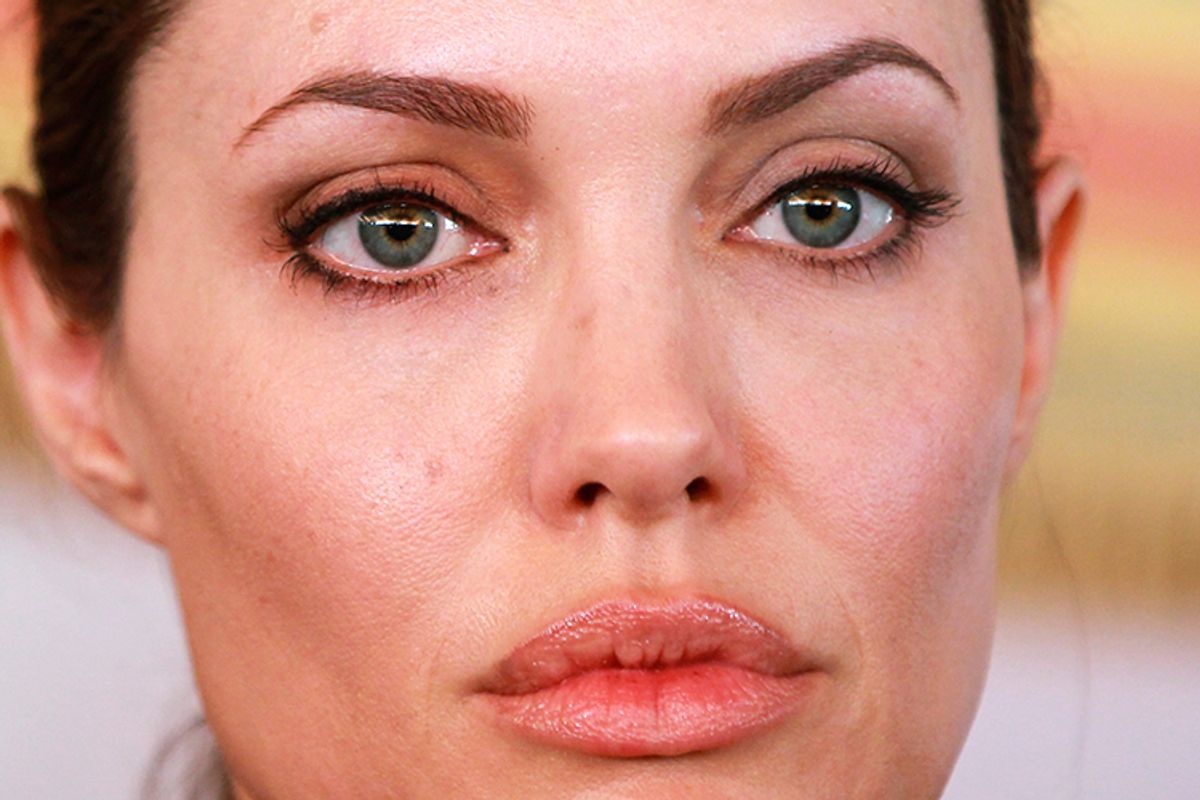So far, much of the heated discussion about Angelina Jolie's brave Op-Ed in the New York Times today has focused on her decision to undergo a double mastectomy after learning she carried the BRCA1 gene. As Salon noted here, that's not the only option. But for those who do want to consider following Jolie's path, there are structural barriers to even gaining the information to make those choices, something she mentions but doesn't explain. It's because one company, Myriad Genetics, owns the patent to the two genes that indicate an increased risk of breast or ovarian cancer. You read that right: The genes themselves, not the procedure to test for them. And the Supreme Court will decide in a matter of weeks whether that should continue.
Jolie wrote, "It has got to be a priority to ensure that more women can access gene testing and lifesaving preventive treatment, whatever their means and background, wherever they live. The cost of testing for BRCA1 and BRCA2, at more than $3,000 in the United States, remains an obstacle for many women." According to the ACLU, which brought the lawsuit heard recently by the Supreme Court, Myriad actually recently raised the price to over $4,000, despite the fact that "genetic testing technologies have advanced to the point where all 23,000 human genes can be sequenced for $1000." The test is often covered by insurance, but policies vary, and of course, not everyone is insured.
Myriad's monopoly over BRCA1 and BRCA2 not only means showing that it can charge whatever it wants for the test; it also means that further research on the genes is restricted, and that women who take the test and get an ambiguous result can't get a second opinion, only take the test again. An ambiguous result can mean the difference between removing breasts or ovaries or leaving them intact.
The economic and racial implications of all this are major, both for how the research has been done and who gets access to it. In a video on the case, the ACLU points out, "Initial gene studies focused on white women. And now the patents make it more difficult to learn what some mutations mean in women of color, because Myriad has total control over researchers' access to those mutations." And information that allows some women to choose prophylactic surgery likely contributes to the massive disparities in who dies of breast cancer. Black women are the likeliest to die of breast cancer, even as they are less likely than white women to be diagnosed with it. A 2005 study in the Journal of American Medicine found that "African American women with a family history of breast or ovarian cancer were significantly less likely to undergo genetic counseling for BRCA1/2 testing than were white women with a family history of breast or ovarian cancer." That was true even when controlling for socioeconomic factors, suggesting cost was not the only barrier.)
Myriad has argued that its patent was valid because it had innovated in the process of extracting the gene, and that patent protection was needed to incentivize more such research. It lost at the district court level, which threw out its patents, but prevailed at the circuit court. The Supreme Court heard oral arguments in the case a month ago. According to Lyle Denniston at SCOTUSBlog, the ACLU's "Hansen wanted a flat declaration that human genes are not patentable – period. The Justices who pressed him closely left the impression that the suggestion was both too simple, and possibly too inhibiting for inventors and their financial backers." Meanwhile, the Obama administration took a middle route, with Solicitor General Donald B. Verrilli saying that only synthetic DNA molecules should be patented.
Myriad's patent on the genes expires in two years, but the Supreme Court's ruling will set the broader principle going forward. For now, Jolie's Op-Ed has apparently made Myriad's stock price rise 4 percent, its best level in years.



Shares